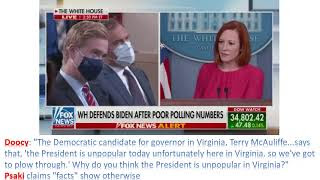Peter Doocy Tries To Blame Biden For Supply Chain Problems, But Jen Psaki Makes Sure He Fails
Q Thank you. First, on the economy: There are a half a million containers floating off the California coast with nowhere to go, major issues in the global supply chain right now. The Vice President warned that this could happen in August. So, why wasn’t more done to prepare?
MS. PSAKI: For the global supply chain issues?
Q Yeah, she was talking in August about, “If you want to have your Christmas toys for your children, now might be the time to start buying them because the delays could be many, many months.”
MS. PSAKI: I asked that because we’ve been talking about the issues in the global supply chain since January. And the President has not only put in place a task force, but we have taken a range of steps to work to address.
Now, it’s not just about ensuring that we are having different companies speak to each other; we’ve certainly done that. We’ve been a forum for hosting different industry leaders to see what we can — what we can reduce, in terms of red tape in the process.
The — one of the biggest issues in the global supply chain is also COVID and the fact that COVID continues to be a threat to supply chains that are happening globally. So, we’ve also worked to be the — by far and away — the largest provider of vaccines, know-how, manufacturing capacity to the world.
So, we’ve not only been talking about this since January, we’ve been working to put in place a range of steps to help address the challenges in the supply chains.
Q And, as we understand it, it’s not just COVID; there are also labor shortages and issues with shipping lines here — overground shipping lines in the U.S. Is the President satisfied that his task force is doing a good job?
MS. PSAKI: The President recognizes that there are several, several layers of the challenge here that contribute to the bottleneck. And on ports and transportation bottlenecks specifically, we appointed — the President appointed a White House Ports Envoy this summer, John Porcari, to work with Secretary Buttigieg and bring stakeholders — labor, private industry — together to help solve the global transportation supply problems.
The fact that he designated and — and appointed someone at that level with a range of vast experience shows that this is a part of the issue we’re absolutely focused on.
We’re also focused, as I noted, on the work of the Supply Chain Task Force, also the semiconductor shortage, which has been an issue that has impacted a range of industries. And we’re working to attack the challenges in the global supply chain at every point they are in the bottleneck.
Q Thank you. The Democratic candidate for governor in Virginia, Terry McAuliffe, who President Biden stumped for over the summer now says, “The President is unpopular today, unfortunately, here in Virginia, so we’ve got to plow through.” Why do you think the President is unpopular in Virginia?
MS. PSAKI: Well, just if you look at facts and the polling, the President is the most popular figure in Virginia of anyone currently running for President or any former recent President. So, I’d just note that, in terms of the data.
But I would say that the President’s agenda is incredibly popular — that’s probably the reason why former Governor McAuliffe is also running on that agenda — whether it is reducing costs for the American people on childcare, on eldercare; making sure the tax system is more fair; rebuilding our roads, rails, and bridges. Those are all components of the President’s agenda that he has huge agreement with Governor Mc- — former Governor McAuliffe on.
Q Thank you. And then just one more topic, following up on his remarks yesterday: President Biden claims that he cold-called a Pennsylvania hospital to ask the desk receiving nurse why it was taking so long for a good friend’s wife to be seen. What happened next?
MS. PSAKI: Well, the context of why the President told this story — which I think is important, and I promise I’ll answer your question — is that he was expressing that hospitals, frontline workers, nurses, doctors in emergency rooms are still seeing and feeling the impact of the number of people who are unvaccinated who are filling beds in emergency rooms, ICUs, and it is preventing, in some cases, people who have other illnesses, who may be seeking treatment, who may be ha- — fearful of a heart attack, who — other people who might be going to the emergency room from getting the care that they need. I don’t have any other update for the privacy of this — this individual.
Q But setting aside the privacy of the individual, how often does President Biden call around trying to help his friends cut the line?
MS. PSAKI: That certainly was not his intention. He was not trying to do that. He was checking in on a friend.
Q And do you know if this particular hospital might have been having staffing shortages because they have a vaccine mandate and maybe some folks have had to leave because they didn’t want to get vaccinated?
MS. PSAKI: I would love for you to account for me where that is the issue at — over — more so than the number of unvaccinated who are filling emergency rooms, filling ICU beds. That is the problem in hospitals across the country.


Comments
Post a Comment